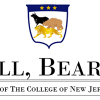This semester, the School of Business welcomed four new faculty members, Matthew Greenblatt, PhD, Economics; Henry Han, PhD, Management; Eddie Inyang, PhD, Marketing; and Jinsil Kim, PhD, Management. Below are interviews with Drs. Greenblatt and Han conducted by the TCNJ School of Business student newspaper, The Bull, Bear & Lion. Stay tuned next semester for interviews with Drs. Inyang and Kim!
Interviewed and edited by Kim Tang ’20 for The Bull, Bear & Lion:
 Matthew Greenblatt
Matthew Greenblatt
Assistant Professor ― Economics
Dr. Matthew Greenblatt is a new professor at TCNJ in the School of Business. He currently teaches Intro to Microeconomics, and in the spring, he will teach Intro to Macroeconomics as well as European Economic History. He studied history at the University of Pennsylvania and earned his Ph.D. at the University of Minnesota. Dr. Greenblatt sat down to share a bit more about his life and experiences.
Where did you grow up?
I grew up in the Philadelphia area, in Delaware County.
How did your childhood shape your choice of your major?
So I grew up in Delaware County, PA — but in high school, I moved to Flint, MI, so I think living there I really saw the direct impact economic policy, good or bad, can have on people’s lives, and I think that’s what really sparked my interest in economics.
How did your education impact your studies in Economics?
I got a great foundation for my graduate studies, and Minnesota was also really good. It’s really interesting; I do macroeconomics, and I think there are a lot of political and theoretical divisions among macroeconomists, more so than microeconomists. Schools really fall into camps amongst these political spectrums, and Minnesota is really on one far end of the spectrum. I think it was a positive experience having my political opinions challenged by my professors. There was also an expectation that you would be teaching and sharing your research all the time, and I think that really prepared me for being in front of the classroom.
Did you work somewhere else before TCNJ?
I didn’t have a full-time job, but I worked as a graduate instructor when I was at Minnesota, and I worked at the Federal Reserve Bank in Minneapolis while I was there.
How were those experiences?
I really liked working at the Fed, and it felt like my work was having a direct impact on economic policy. I like teaching a lot better though. I liked helping students, and I felt like teaching also made my research a lot better too. In economics, more so than a lot of other disciplines, there’s a huge disparity between how much math and other complications you have to add to your thoughts between grad and undergrad. I think being forced to think about your research in both abstract terms and in terms of fundamental theories is important.
What tips do you have for students studying economics?
I think that if you’re really interested in pursuing [graduate school], you need to build a strong math and statistics foundation. I would, if you can, consider a double major in either math or statistics. I think that after you graduate, there are a lot of good internship opportunities; and for people considering graduate studies, an internship is a good half-way point between being an undergraduate and a graduate student. There’s a big disparity between how formal and how mathematical your work is in the two environments, and so I think having a transition between the two through an internship where you’re interacting more closely with economists can help with that.
Do you have any tips for students who are studying business as a broad subject?
We try to teach students in Econ that economics is a philosophical system, that it’s a way of thinking about the world. So what we want to teach business students is how to apply that way of thinking to any question in order to find an answer. We want to teach [them] to apply that system of thinking to any questions [they] may ask. I think there’s a broader skill there in how to apply a general philosophical system to questions, and I think one way to build that [skill] is to take a logic class. I think it would be a really cool thing to do.
What is your favorite part about teaching?
Seeing students thinking about the issues that I’m trying to teach them about. I really enjoyed in grad school having my thoughts challenged and being forced to do more self-analysis and thinking about how the world works; and I really like seeing my students do that [now].
What is something you want TCNJ students to get out of your class?
Critical thinking skills, being able to analyze questions. I would like students to know how answers can be found, and why.
 Xu (Henry) Han
Xu (Henry) Han
Assistant Professor ― Management
Dr. Henry Han is a new professor at the School of Business. He currently teaches two sessions on strategic management and one session on entrepreneurship; and next semester, he will be teaching two sessions on strategic management and one session on venture capital. He studied at China Foreign Affairs University before obtaining his Ph.D. at Guanghua School of Management at Peking University. Dr. Han sat down for an interview to share a bit more about his life and experiences.
Where did you grow up?
I grew up in China, in a city on the East coast near the hometown of Confucius.
How did you decide that you wanted to study Management?
I was interested in a lot of stuff, mostly literature, politics, and science. China has standardized tests to get into college, but I received a waiver for those tests and was selected because I specialized in foreign language. I was enrolled in a program where I studied international law for four years, and then I got another waiver for an exam to pursue a graduate degree, but in Management, at Peking University. That is how I switched from International Law to Management.
From studying in China, are there any noticeable differences in the way you see in how the Chinese higher education system functions compared to the American higher education system?
I feel like that at the college level, the U.S. education system is more open. [Higher education administrators] understand that there is a lot of uncertainty in the world, and there are a lot of ways to solve similar problems, versus in China, [where] we somehow emphasize efficiency more. Basically, the professor will show you the optimal way to solve the problem and that’s it. In that way, it’s hard to build creativity into students’ skills. Here, I think once you open the question, it allows students to think more. But I think in China, the upside is that students have a more solid foundation in their basic skills so they can solve the simple problems faster.
Was the transition from International Law to Management difficult or was it an easy progression?
It was a good progression. My experience with international law and diplomacy really taught me a lot of things that my management classes did not teach me. When you think about laws and diplomacy, you think more about the equity, the dynamics and chemistry among people versus with [managing] people, you emphasize more efficiency and profitability. But in great businesses, you see a balance of both. I think my experience in diplomacy gave a me a far better understanding of people.
Did you work elsewhere before coming to TCNJ?
Yes, I worked at Wharton for six years, including my post-Doc.
What did you do at Wharton?
I was first there for my post-Doc doing research on entrepreneurship and family businesses, and then I started teaching management and venture capital I also taught entrepreneurship.
Which one of those was your favorite to teach?
Venture capital.
How did you get involved in venture capital and entrepreneurship?
The reason I started teaching venture capital was because I was a TA for my advisor for several years, and that course got me interested in venture capital investment. Previously I knew nothing about venture capital, but when I was TAing for his course, I was helping him prepare for the course and I learned a lot. We also wrote two cases together about venture capital investment and startup companies. That was how I learned more and more about the field. Then I started talking with people in venture capital and working on a startup myself. Entrepreneurship is basically the other side of venture capital. Venture capital is the capital side, and entrepreneurship is the business side. I had a lot of students who wanted to start their own companies and who pitched ideas to me, and so I had a lot of exposure to the issues entrepreneurs have. And then I was asked to teach an entry level entrepreneur course [at Wharton].
What tips do you have for students going into management, entrepreneurship, or anything that you have taught?
I think management and entrepreneurship are two different paths, but with management, I think the most important thing you have to realize for managing people is that you have to understand people well. You have to understand people on an individual level and a collective level. I would say having a foundation in psychology or sociology would definitely help you to understand people better, and then you can build a managerial skillset. For entrepreneurship, that’stotally something different, especially in today’s environment. You definitely need strong people skills, but I also think you need to understand the customer well; you need to understand technology well. Understanding the customer allows you to know what problems need to be solved; the understanding of technology allows you to know what things you can do to solve the problem.
What is one skill you believe all business students should have?
I would say people skills.
What’s the best approach to improving people skills?
Practice. Networking. Just talk more with people.
What is your favorite part about teaching?
Case discussions. I really enjoy discussing real world cases with students in class. I think it gives a lot of real-world richness and it allows you to think deeper about the principles and the hypotheses, which is really fascinating. And I’ve been inspired from time to time when having these discussions in class.
Do you incorporate a lot of case discussions in your lesson plans?
Yes. So when I teach my class, I have time for lecture and time for case discussions. I think it’s nice to connect the theory and the practices.
What is something you hope TCNJ students will get out of your class?
I hope they get practical relevance. You can get a lot of theory from reading the books, but I hope the students who take my class will see how things play out in reality and how they can apply what they learned from the textbook into practice.

